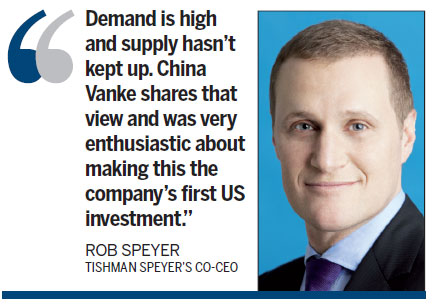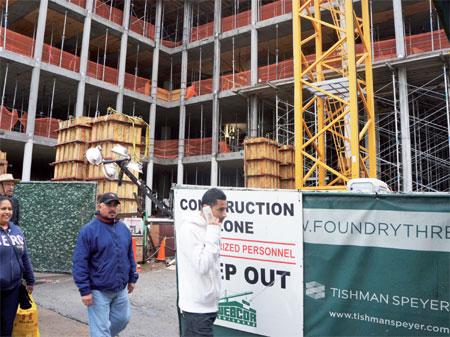Overseas properties are a beacon
Updated: 2013-02-20 12:13
By Chen Jia in San Francisco and Hu Yuanyuan in Beijing (China Daily)
|
||||||||
|
Pedestrians walk by Foundry Square III which was under construction by Tishman Speyer at Howard Street in San Francisco. Ann Lin / China Daily |

Top developer China Vanke Co is teaming with US-based Tishman Speyer Properties on a luxury condominium building in San Francisco, highlighting Chinese real estate firms' focus on projects abroad.
Vanke, the biggest developer in China by market value, confirmed on Monday that it would be making its first move into the US market.
"We are strong believers in the San Francisco residential condominium market," Tishman co-CEO Rob Speyer told China Daily on Tuesday. "Demand is high and supply hasn't kept up. China Vanke shares that view and was very enthusiastic about making this the company's first US. investment.
"I greatly admire Wang Shi and we have developed a friendship over the past few years," he said, referring to Vanke's chairman." I also have enormous respect for the success of China Vanke, so I welcomed the opportunity to collaborate on a project."
The companies will jointly develop a site consisting of two connected residential towers - 37 and 42 stories high - with a total of 655 units. Located at 201 Folsom St in San Francisco's South of Market, or SoMa, neighborhood, the site is across from the Infinity, a pair of residential towers developed by Tishman Speyer.
Neither a construction timetable nor estimated investment amounts were disclosed, but a joint statement from the companies said prices at the Infinity ranged from $600,000 to $6 million per residence.
Speyer estimated that the project will create as many as 300 construction jobs between 2013 and 2016, and ultimately produce about $10 million a year in residential-property taxes.
As of Sept 30, Tishman Speyer had acquired, developed or managed a portfolio of over 125 million square feet totaling $61.3 billion since the firm's founding in 1978. Its top properties include New York's Rockefeller Center and Chrysler Building, Torre Norte in So Paulo, Ventura Corporate Towers in Rio de Janeiro and the Opernturm in Frankfurt. The firm also has projects at various stages of development in Brazil, India, Germany, France and several Chinese cities.
The joint venture with China Vanke expands Tishman Speyer's relationship base in China, where it has raised funds from Chinese investors and now has projects totaling 20 million square feet under development.
Skip Whitney, an industry insider whose firm does business in China, called this "one of the best times to invest in real estate in recent years, with the US residential and commercial real estate markets recovering from the 'great recession'."
"For the first time there are opportunities for foreign capital to invest in real estate with an improving market that haven't existed in decades, and it is a great time for Chinese investors to take advantage of the situation," said Whitney, executive vice-president at Kidder Mathews, a commercial real estate firm on the West Coast.
He said Vanke's decision was a smart move.
"San Francisco is one of the most dynamic cities in the world due to its ecosystem and being the center for innovation and world-class education," Whitney said. The city also boasts one of the strongest US real estate markets, longtime status as a gateway for Chinese visitors and immigrants, a Chinese-American mayor (Ed Lee) and a large ethnic Chinese population, he pointed out.
The deal announced this week followed Vanke's establishment of a research team last year to consider development prospects in the US.
In another part of the developer's global strategy, Shenzhen-based Vanke announced in January that it will shift trading of its non-yuan shares to the Hong Kong Stock Exchange.
The company also recently joined with New World Development to buy a residential site in Hong Kong for HK$3.4 billion ($439 million), its first project outside the Chinese mainland.
"After 30 years of development, our go-global strategy is ready to be implemented. And access to an open international capital market is necessary for such a strategy," said Tan Huajie, Vanke's board secretary.
"It is just the beginning of Chinese property developers going global," said Qin Xiaomei, director of strategic consulting in the Beijing office of Jones Lang LaSalle, a global property-services provider.
Other Chinese real estate firms have made inroads internationally.
Guangzhou-based Country Garden, whose stock trades in Hong Kong, set up a joint venture with Malaysian real estate firm Mayland in 2011 to develop two residential projects, taking a 55 percent stake. This was followed by Country Garden's development of a commercial complex in Malaysia last year.
These projects, targeting local as well as Chinese buyers, will open for sale this year.
"We are also on the lookout for quality land parcels overseas. If there are appropriate opportunities, we will not miss them," said a company executives who declined to be identified by name.
Beijing Capital Land signed an agreement last year to purchase a parcel in France on which it plans to establish a Chinese-French economic zone.
Wanda Group, China's biggest developer of commercial property, has disclosed plans to invest $10 billion in the US over the next decade, particularly in hotels, retail and commercial properties.
In September, Xinyuan Real Estate Co of Beijing announced its $54.2 million purchase of a planned condominium site in the New York City borough of Brooklyn that the firm said was the first major US residential-property deal by a Chinese developer.
Developers are following the trail of Chinese buyers of overseas properties, according to Jones Lang LaSalle's Qin. "But a number of institutions are also finding opportunities overseas amid the global economic slowdown," he said.
Chinese buyers have been encouraged by the yuan's appreciation and government policies to restrict real estate investment domestically, Qin said.
"We have noticed a growing enthusiasm among Chinese investors to buy overseas real estate, and the UK and the US are their favorite markets."
At 11 percent of sales, Chinese are the largest single group of foreign buyers in the US property market, Wang, the Vanke chairman, wrote in a micro blog post on Sina Corp's Weibo platform.
Institutional investors from China are checking opportunities abroad.
China Investment Corp, the country's sovereign wealth fund, and two other Asian investors are reportedly competing to buy a London office complex valued at 800 million ($1.3 billion). The Financial Times, citing unidentified sources, reported that this would be the most expensive property deal in the UK since the start of the financial crisis in 2008.
(China Daily 02/20/2013 page1)

 In Photos: 7.0-magnitude quake hits Sichuan
In Photos: 7.0-magnitude quake hits Sichuan
 Li Na on Time cover, makes influential 100 list
Li Na on Time cover, makes influential 100 list
 FBI releases photos of 2 Boston bombings suspects
FBI releases photos of 2 Boston bombings suspects
 World's wackiest hairstyles
World's wackiest hairstyles
 Sandstorms strike Northwest China
Sandstorms strike Northwest China
 Never-seen photos of Madonna on display
Never-seen photos of Madonna on display
 H7N9 outbreak linked to waterfowl migration
H7N9 outbreak linked to waterfowl migration
 Dozens feared dead in Texas plant blast
Dozens feared dead in Texas plant blast
Most Viewed
Editor's Picks

|

|

|

|

|

|
Today's Top News
Live report: 7.0-magnitude quake hits Sichuan, heavy casualties feared
Boston suspect cornered on boat
Cross-talk artist helps to spread the word
'Green' awareness levels drop in Beijing
Palace Museum spruces up
First couple on Time's list of most influential
H7N9 flu transmission studied
Trading channels 'need to broaden'
US Weekly

|

|









